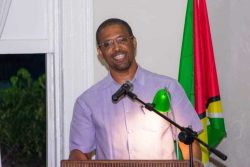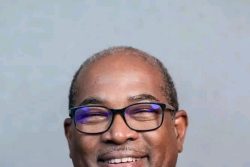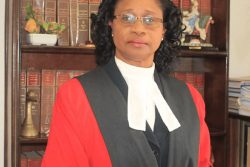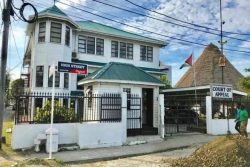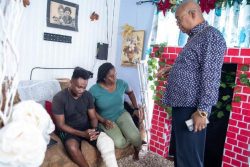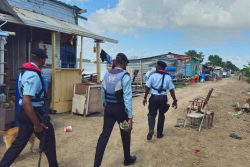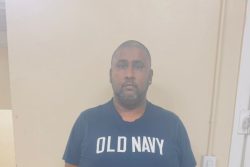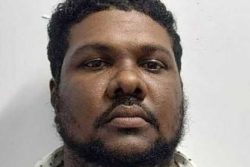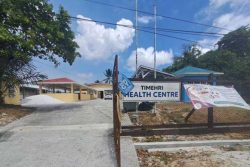US Federal Judge Dora Irizarry yesterday afternoon said that while no sentence imposed on confessed drug trafficker Shaheed Roger Khan would make right whatever atrocities he had committed, the fact that he would serve time in a US prison meant that justice has been served.
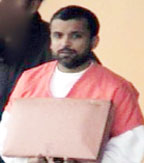
Justice Irizarry made this statement minutes before she sentenced the Guyanese drug lord to two 15-year and one ten-year prison terms, all of which would run concurrently. He was also ordered to pay a special assessment of US$300.
Following his prison term, the judge said, Khan would be placed on five years supervised release, but would more than likely be deported. And she warned him that if he re-entered the US illegally after deportation, he would be arrested and sentenced to a much longer prison term than the present one.
The judge did not fine the convict because of “his inability to pay.”
Yesterday’s sentencing brought a climax to Khan’s case which had riveted the country as explosive information linking the Guyana government to the once powerful and violent drug lord was revealed. Khan’s famous and now convicted lawyer’s trial had been similarly revealing. Among others, the revelations linked Health Minister Dr Leslie Ramsammy to Khan and implicated him as being the government official authorizing the importation of the now infamous spy equipment to Guyana. Ramsammy has repeatedly denied any links to Khan.
“Fifteen years in a US prison is very long time,” Justice Irizarry said just around 3 pm yesterday when she sentenced Khan, the leader of a cocaine trafficking organization based in Georgetown and one of the primary controllers of cocaine flowing out of Guyana and into the US.
When given an opportunity to address the court, Khan, who was accused of having headed the deadly ‘Phantom Squad’ said to be responsible for dozens of unsolved killings, said in a barely audible voice that he was sorry for the “pain” his actions caused the citizens of the US. He also apologised to his family for the pain his actions caused them. He made no mention of Guyana or Guyanese.
And in what could be seen as a parting shot at his former attorneys Robert Simels and Arianne Irving – who are both awaiting sentencing having been convicted of witness tampering and other charges arising out of their representation of Khan — the drug convict thanked his two lawyers, Diarmuid White and John Bergendahl for “being men of integrity.
“I am serious the US should be happy to have men like these as citizens,” he added.
Justice Irizarry spent almost 35 minutes in the hour-long proceedings explaining why she accepted the plea bargain and referred to three letters — one by a cousin of the slain Ronald Waddell, one by a Harry Rampersaud and another anonymously written — all of which called for Khan to be given a longer sentence.
As the judge read the letters, one of which said Khan’s drug empire caused a lot of pain, grief and suffering for many families, the drug lord’s many relatives listened keenly and some even wept openly. His mother, Gloria Khan, bent her head and covered her face.
She later told reporters outside the court that she was happy it was over, but refused to address the concerns in the letter, preferring to say that people would always say “positive or negatives about someone.” She described her son as a “powerful child of God”.
A cousin of Khan said that after his return to Guyana the government should pay him and give him a pension. Asked why the government should make such a move the cousin said “no comment” and walked away.
Khan’s wife refused to talk to the many Guyanese journalists who had turned up at the court for the trial.
Khan had pleaded guilty, almost three years after he was held in Suriname, to conspiring to import cocaine into the US, witness tampering and gun running.
The long-awaited sentencing hearing commenced promptly at 2 pm when a clean-shaven Khan, dressed in a grey prison jumpsuit, made his way into court in smiles and waved to his many relatives, including his mother and wife, who were in court.
As Justice Irizarry prepared to address the court Khan and his wife were observed mouthing words to each other.
The courtroom was packed to capacity and many persons were forced to leave because no standees were allowed. Even the bar tables had several lawyers sitting and several US federal agents, believed to have assisted in the investigation into Khan’s drug empire, were also present.
Fifteen years
against acquittal
Addressing the packed courtroom Justice Irizarry went to great lengths to explain why she accepted the plea bargain made between the prosecution and the defence.
She made mention of the points raised by the government in the sentencing memorandum, which were relied on by Prosecutor Shannon Jones in court, and which said, among other things, that government agreed to a plea bargain with Khan in part to protect information about other targets of the investigation.
Jones noted that the plea agreement helped them to keep under wraps, the information from cooperating witnesses about the other targets.
The prosecutor explained that the disposition of the case without the need for a lengthy or costly trial would conserve substantial judicial and US government resources, while avoiding litigation risks for both sides. She noted that the US government had anticipated calling numerous witnesses at the narcotics trial, many of whom are Guyanese citizens. In anticipation, the prosecution took steps to protect the witnesses from retaliation or intimidation by not disclosing their identities, relocating certain individuals and delaying or avoiding deportations to Guyana.
The Probation Department, according to Judge Irizarry, had recommended that Khan be sentenced to at least 25 years for his crimes. However, Jones, addressing the concern of the department and the letter writers pointed out that the challenge was not between 15 years and 25 or 40 years but rather it was between 15 years and a possible acquittal. She pointed out that after he fled the US Khan insulated himself in Guyana and as such all the evidence they had against him was from cooperating witnesses, many of whom were convicts themselves and drug traffickers caught in the act.
Judge Irizarry said she was in agreement with the position taken by the government and pointed out that a sentence in a plea agreement is by law imposed pursuant to the plea bargain and not the sentencing guidelines.
“Once the court has accepted the plea, the court cannot deviate from the sentencing agreement. This has fairly been the law for close to two decades,” the judge said.
The judge also disclosed that before she accepted the plea she had requested that the government provide her with the basis for the plea bargain and having presided over the case and the many motions prior to the plea, she accepted the government’s justifications.
‘Tossing of a dice’
Justice Irizarry noted that one of the reasons the United States is admired in some ways is because it is a country that deals with the rule of law- that is, there is equal justice for everyone regardless of who that person is, whether they are legal or illegal residents.
“Nothing that we do here today would ever be able to address the suffering that may have been caused by Mr Khan’s action but I must agree with his lawyer Mr White that 15 years is a very long time,” the judge said.
She also noted the point raised by Jones that Khan had insulated himself in Guyana and she felt strongly that much of the evidence presented by the government could not have been used in the trial simply because the crimes were committed in Guyana.
Further, the judge noted that the US is a country of law and a country which has the oldest constitution in the world and every time a crime is committed the accused has a right to a trial by jury. The jury would have had to hear evidence from Khan’s accomplices and she described the scenario as the “tossing of a dice” when the prosecution has no such witnesses. It is left all up to the jury and whether they find the witness credible, the judge said adding that she has seen many cases where everyone was sure the accused would have been convicted but the jury acquitted because they did not find the witnesses credible.
She also pointed out that the gun-running case was 16 years old and that it was hard enough to get a conviction on a recent case much less one that old when no one really knew where the investigating agents were since some of them may have retired while others may have gone to the great beyond.
And to make matters worse the judge said, many of the witnesses may have no longer wanted to testify following the witness tampering charges. She gave the example of a cooperating witness fleeing the jurisdiction in the middle of a trial she was prosecuting. She said those were some of the challenges the government faced.
Khan’s optimistic expression did not change when the sentence was handed down and he again smiled brightly and waved to his relatives as he left the courtroom. His wife shouted out to him, “I love you Rog.”
Khan was charged with conspiring to import cocaine into the US over a five-year period from January 2001 to March 2006. The US government had said he was the leader of a cocaine trafficking organisation based in Georgetown. It also asserted that he was able to import huge amounts of cocaine into Guyana, and then oversee exportation to the US and elsewhere.
The US government had charged that a significant amount of the cocaine distributed by Khan went to the Eastern District of New York for further distribution. As an example, it cited a Guyanese drug trafficking organisation based in Queens, New York, which it said was supplied by Khan. The Queens organisation was said to have distributed hundreds of kilos of cocaine in a two-month period during the spring of 2003.
Khan had resided in the US and committed crimes in both Maryland and Vermont. On January 6, 1992 he was convicted in Montgomery County of breaking and entering and theft. While he was on probation for that offence, he was arrested in Burlington, Vermont for receiving and possessing three firearms while being a convicted felon. He was subsequently indicted and was released on bail in November 1993. He promised to obey all conditions of his release but fled to Guyana in 1994 in order to avoid prosecution and as a result there is an outstanding warrant for him, for violating the conditions of his partial release and an outstanding warrant in Rockville, Maryland for violating the conditions of his probation.
Witness tampering
Khan’s troubles deepened last year when he, Simels and Irving were hauled before the courts and charged with conspiracy to tamper with witnesses relating to the drug trial. Simels was accused of making an alleged US$1,000 payout and having discussions about “eliminating and neutralizing” witnesses. He and his assistant allegedly had numerous discussions with a US government informant, to locate certain individuals close to the case and to get them to rescind statements, not testify against Khan, or even to be eliminated.
In her affidavit to support the charges against Khan, Simels and Irving, Special Agent of the Drug Enforcement Administration (DEA) Cassandra Jackson had said that during Khan’s drug trial the government would seek to establish that he was the leader of a “violent drug trafficking organisation [the Khan organisation] that was based in Georgetown, Guyana, from at least 2001 until his arrest in 2006.” She had said that Khan and his co-conspirators obtained large quantities of cocaine, and then imported the cocaine into the Eastern District of New York and other places for further distribution. “Khan was ultimately able to control the cocaine industry in Guyana, in large part, because he was backed by a paramilitary squad that would murder, threaten, and intimidate others at Khan’s directive. Khan’s enforcers committed violent acts and murders on Khan’s orders that were directly in furtherance of Khan’s drug trafficking conspiracy,” Jackson had said. She said the paramilitary squad was referred to as the ‘Phantom Squad’.
These same accusations had last year led Justice Irizarry to rule in favour of an anonymous jury for the drug trial. The judge was of the opinion that the dangerousness of Khan, as alleged by the prosecution, was a fact worth considering since according to one of the government’s confidential sources the ‘Phantom Squad’ Khan was associated with was responsible for “at least 200 extra-judicial killings” in Guyana from 2002 to 2006.
While Khan was not charged with crimes considered violent in nature, his involvement with and leadership of a criminal organisation indicated his propensity for violence, the judge had pointed out. In making her ruling, the judge had said there was evidence of Khan’s willingness to tamper with the judicial process since he admitted that in 1993 he successfully evaded federal prosecution in Vermont for possession of a firearm by a convicted felon by absconding to Guyana while on bail. That action, the judge said, indicated his ability to tamper with the judicial process in the US.
Execution-style killings down
The US government had also accused Khan of murdering boxing coach Donald Allison, who was gunned down outside his Agricola home and Dave Persaud who was shot and killed outside the then Palm Court Restaurant and Bar on Main Street. Khan denied the charges, stating Allison had been supplying the Buxton criminals with guns and that national cyclist, Tyrone Hamilton, knew who had killed Persaud.
In Guyana, the police appeared to have accepted that Khan was responsible for the execution-style killings. In November 2007, Crime Chief Seelall Persaud said that since Khan’s capture, execution-style killings in Guyana had dropped considerably from 43 in 2006 to 12 in 2007.
Persaud said Khan had a group of men who worked with him while he was here, but since he had been locked up the men had all gone in different directions. “We believe that Mr Khan was involved in narcotics trafficking and since his arrest we have seen a fragmentation of his gang instead of them being one place they are all over the place,” Persaud had declared. When asked why–since the police knew Khan operated a gang and had men–the force had not gone after them, Persaud said charges were laid against individuals based on evidence. He had said the police were investigating Khan’s gang.
Prior to Khan’s arrest, one of his associates had told this newspaper that Khan never got involved in the actual operations. The associate, who had asked not to be named, said the drug accused used his bodyguards and a network of armed informants–the ‘Phantom Squad’–made up of mainly ex-convicts and ex-policemen.
Khan had boasted that when a US diplomat was kidnapped and taken to Buxton he had met operatives from the American Embassy here on a daily basis and provided them with information and hard evidence. This subsequently led to the issuance of an arrest warrant for prison escapee Shawn Browne, who was thought to have masterminded the abduction. Browne was cornered in a house a few days later and shot dead by the police.
Stabroek News was told that Khan had employed ex-convicts and policemen, paid them and had them gather intelligence on the whereabouts of the five escapees Browne, Troy Dick, Andrew Douglas, Dale Moore and Mark Fraser. The quintet had made a bloody escape from the Camp Street Prison on February 23, 2002, and that had been the catalyst for a wave of crime that the country had never before experienced. During this period some 21 policemen were shot dead and numerous civilians murdered. This period also saw scores of policemen leaving the job; confidence in the force was at an all-time low.
